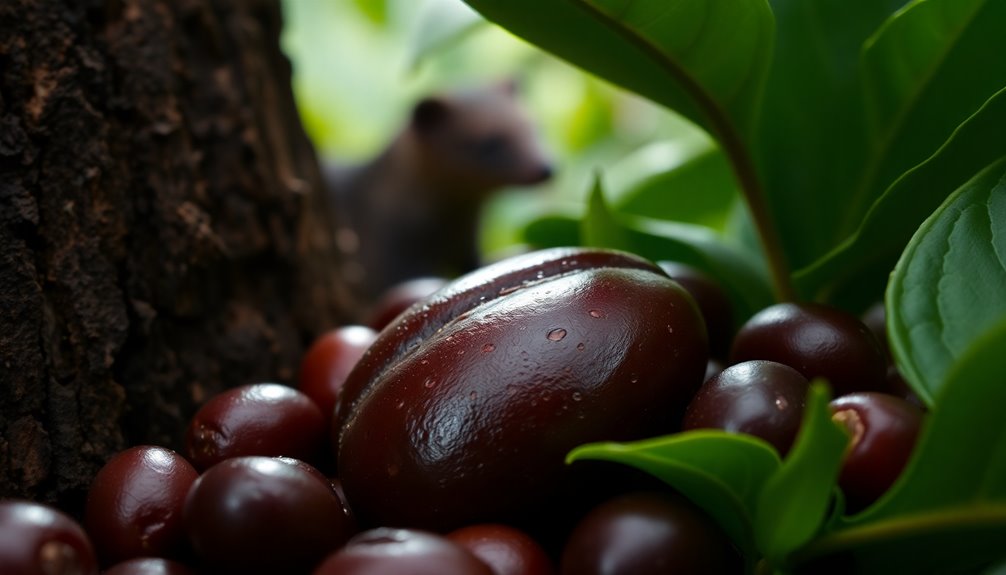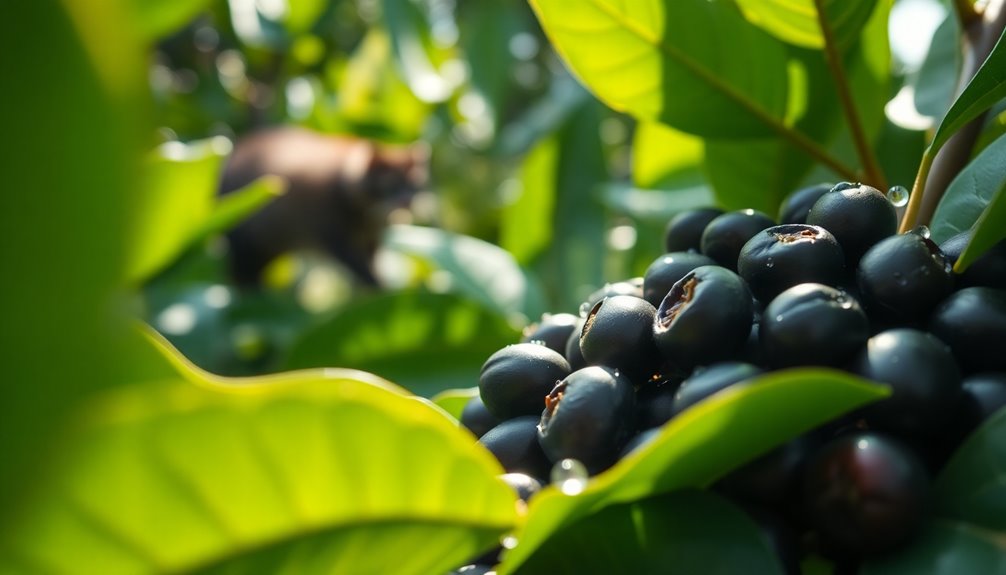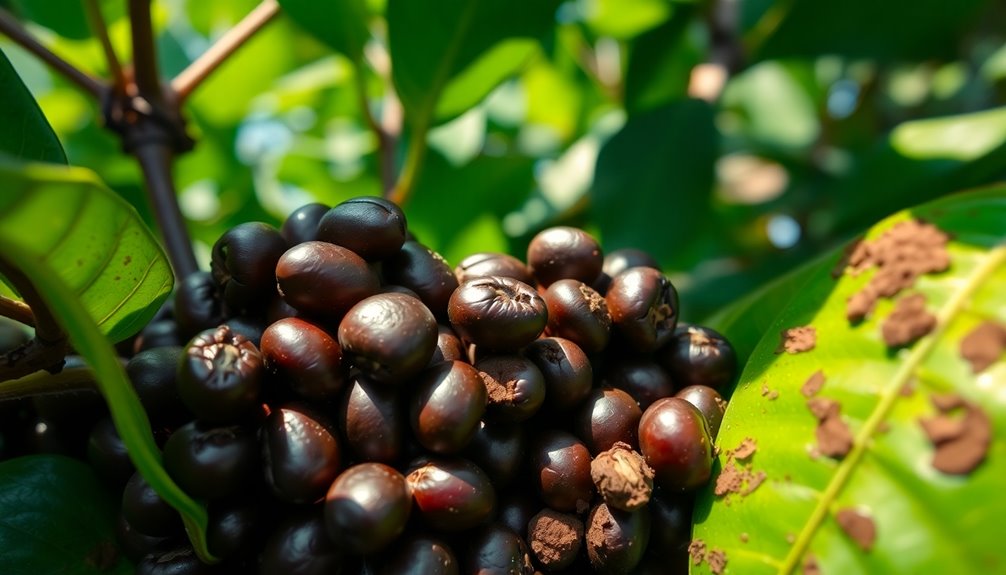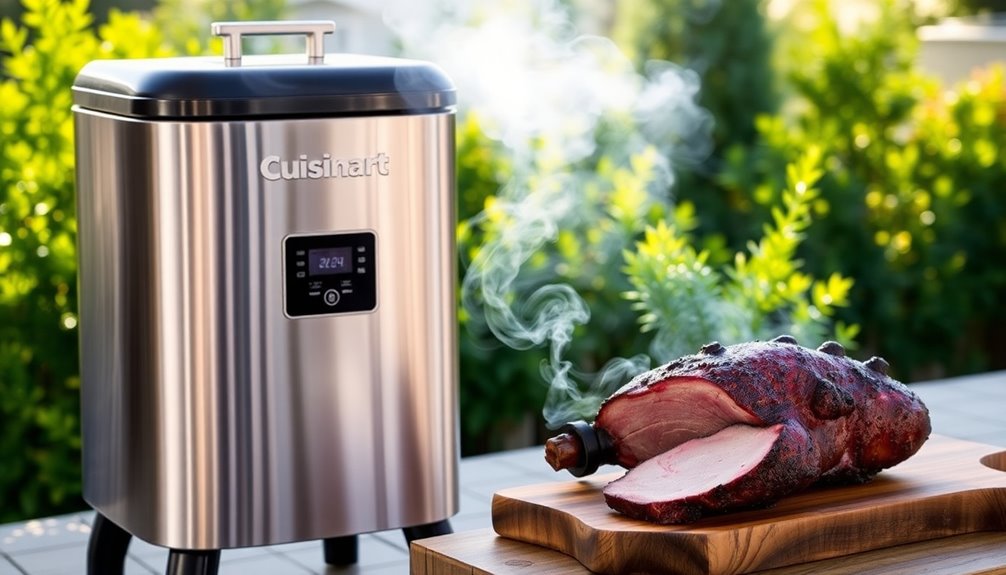Kopi Luwak, or civet coffee, intrigues you with its unique flavor profile, crafted through the digestion of coffee cherries by the Asian palm civet. However, its production raises significant ethical concerns. Many civets are kept in poor conditions, leading to serious health issues, while some are force-fed to maximize production. The high price tag, sometimes reaching $600 per kilogram, only adds to the controversy as market demand drives questionable sourcing practices. As you explore this world further, you'll uncover how animal welfare, environmental impact, and consumer choices shape the future of this fascinating beverage.
Key Takeaways
- Kopi Luwak, or civet coffee, is made from beans digested and excreted by Asian palm civets, creating a unique flavor profile.
- The high price tag of Kopi Luwak, reaching up to $600 per kilogram, fuels demand and controversy over ethical sourcing practices.
- Ethical concerns arise from caged civets living in poor conditions and being force-fed coffee cherries, leading to serious health issues.
- The rise in demand for Kopi Luwak contributes to habitat destruction and poaching, threatening wild civet populations and ecosystems.
- Mislabeling and fraud are rampant in the Kopi Luwak market, complicating the identification of truly ethically sourced products.
What Is Kopi Luwak?

If you've ever heard of Kopi Luwak, you might be surprised to learn that it's not your typical cup of coffee. Known as civet coffee, this unique brew is made from coffee beans that have been digested and excreted by the Asian palm civet.
The digestive process alters the beans' flavor, resulting in a smoother taste that can fetch prices as high as $600 per kilogram. Though it dates back to the 18th century during the Dutch colonial era, Kopi Luwak faces criticism for animal cruelty, especially concerning caged civets.
Authentic wild civets that produce this coffee are becoming scarce, and many products marketed as Kopi Luwak are often mislabelled, raising ethical concerns in the process.
The Production Process

The production process of Kopi Luwak begins when Asian palm civets consume ripe coffee cherries, with only the outer pulp being digested while the beans remain intact. After digestion, the beans are collected from the feces, washed thoroughly, and then dried and roasted.
The civet's digestive enzymes ferment the beans, altering their chemical composition, which leads to a smoother flavor profile.
However, this process raises several concerns:
- Labor-intensive collection methods
- Establishment of factory farms
- Cramped conditions for civets
- High prices exceeding $1,500 per pound
- Ethical concerns regarding animal welfare
These factors contribute to both the fascination and controversy surrounding Kopi Luwak coffee, making it a unique yet contentious product in the coffee world.
Animal Welfare Concerns

When you think about kopi luwak, consider the harsh conditions many civets face in captivity.
These cramped cages can lead to serious health issues and stress for the animals, raising important ethical questions about how this coffee is sourced.
As you explore the world of animal poop coffee, it's essential to reflect on the welfare of the civets involved.
Caged Civet Conditions
While many coffee lovers savor the unique flavor of kopi luwak, the conditions in which civets are kept raise serious animal welfare concerns.
Caged civets often face cramped, unsanitary environments that lead to malnutrition and stress. Research from Oxford University highlights the inhumane practices in civet coffee production.
Consider these ethical concerns:
- Civets are frequently force-fed coffee cherries to boost production.
- Many live in factory farms, leading to high mortality rates.
- Lack of social interaction results in abnormal behaviors.
- Conditions are often described as brutal and unsanitary.
- Advocacy for humane alternatives is growing among animal rights organizations.
Choosing ethically sourced coffee can help alleviate these issues and promote animal welfare.
Health Issues in Civets
Although many people enjoy the rich flavor of kopi luwak, civets' health issues reveal a troubling side to this coffee production. Civets raised for this coffee often face severe health challenges due to confinement in cramped conditions. They suffer from malnutrition, obesity, and stress-related disorders, compromising their overall well-being.
| Health Issue | Description |
|---|---|
| Malnutrition | Lack of proper diet leading to health problems |
| Obesity | Result of overfeeding and lack of exercise |
| Stress-related disorders | Psychological distress from confinement |
| Digestive problems | Caused by force-feeding coffee cherries |
These conditions raise significant animal welfare concerns and highlight the ethical implications of civet coffee production.
#
Ethical Sourcing Challenges
The ethical sourcing challenges surrounding kopi luwak are alarming, especially regarding the treatment of civets involved in its production.
Many civets endure caged production in cramped, unsanitary conditions, raising serious animal welfare concerns.
Here are key issues to reflect upon:
- Civets are often force-fed inferior coffee cherries, impacting their health.
- Caged environments lead to malnutrition and stress from isolation.
- High demand fuels poaching, threatening wild civet populations.
- Certification programs exist but lack reliable schemes for ethical sourcing.
- Consumer awareness and advocacy are essential for humane practices.
Quality and Flavor Insights

When exploring the quality and flavor of Kopi Luwak, you'll find that opinions vary widely among coffee enthusiasts. Its flavor is often described as smooth and rich, featuring notes of chocolate, caramel, and earthiness.
However, many industry evaluations rank it lower compared to other specialty coffees. Critics argue that the digestive process of civets alters the beans' chemical composition, potentially stripping away desirable flavors and acids.
While wild civets tend to select ripe cherries, caged ones often receive inferior beans, impacting overall quality. Tasting experiences highlight the coffee's low acidity, enhancing its smoothness.
Yet, the subjective nature of flavor perception means that you'll encounter a range of opinions about whether Kopi Luwak lives up to its luxury reputation.
## Ethical Sourcing Challenges

As you explore the intricate world of Kopi Luwak, you can't ignore the ethical sourcing challenges that have emerged alongside its popularity.
The rise in demand has led to the farming of caged civets, which often face severe animal welfare violations. Despite certification programs like SAN and UTZ, no reliable system guarantees wild-sourced authenticity.
Consider these critical issues:
- Caged civets experience malnutrition and isolation.
- Fraudulent labeling misleads consumers about product origins.
- Lack of transparency complicates ethical sourcing efforts.
- Wildlife crime is exacerbated by rising luxury coffee demand.
- Habitat destruction and poaching threaten civet populations.
Understanding these challenges is crucial as you navigate the complexities of enjoying Kopi Luwak responsibly.
Market Demand and Economics

While the allure of Kopi Luwak drives its price to staggering heights—sometimes reaching $600 per kilogram—this demand considerably impacts both local economies and ethical practices in Southeast Asia.
The rising market demand for specialty coffee, particularly Kopi Luwak, has bolstered economic gain in areas like Bali, where coffee tourism flourishes. However, high consumer interest often leads to the proliferation of caged civet farms, raising serious animal welfare concerns.
Price fluctuations affect local farmers' livelihoods, creating opportunities for exploitation alongside potential profits. Furthermore, the lucrative nature of Kopi Luwak can invite fraudulent practices, such as mislabeling caged civet coffee as wild-sourced, which undermines the product's integrity and pricing.
Balancing demand and ethics remains vital for sustainable practices.
Cultural Significance and Impact

Kopi Luwak coffee holds a rich cultural significance that dates back to the 18th century, rooted in the traditions established during Dutch colonial rule in Indonesia. This unique brew reflects local customs and has become a symbol of luxury, substantially impacting tourism and economies in Southeast Asia.
Key aspects of its cultural significance include:
- Traditional brewing methods emphasizing heritage
- The allure of exclusivity in high-end cafes
- Legends surrounding civets, like the "Legend of the Weasel"
- The ethical controversies regarding animal welfare
- Shifting consumer preferences towards cruelty-free products
While kopi luwak embodies rich traditions, the ongoing debates about its production raise essential questions about sustainability and animal welfare, challenging its esteemed status in contemporary culture.
Environmental Implications

The growing demand for civet coffee has significant environmental implications that can't be overlooked. As the kopi luwak industry expands, habitat destruction becomes a pressing concern, threatening wild civet populations and their ecosystems.
Intensive farming practices often lead to civets in cages, causing severe animal welfare issues and diminishing the species' natural behaviors. Additionally, reports of increased poaching of wild civets highlight the urgent conservation concerns tied to this industry.
The unethical treatment of these animals, including malnutrition and isolation, further complicates the sustainability of coffee production. To mitigate the environmental impact, embracing sustainable coffee sourcing practices is crucial.
Protecting civets and their habitats guarantees that coffee lovers can enjoy their brew without compromising ethical and ecological standards.
Mislabeling and Fraud Issues

As demand for civet coffee skyrockets, mislabeling and fraud have become rampant issues within the industry.
Investigations by organizations like PETA and the BBC reveal that coffee from caged civets is often falsely marketed as ethically sourced from wild civets.
With limited regulations, distinguishing genuine kopi luwak from counterfeit products is tricky.
Here are some key points to reflect on:
- Many brands exploit the high demand for kopi luwak.
- Less than 127 kg of ethically sourced coffee was produced annually in 2014.
- Caged civets are frequently used in fraudulent practices.
- Advanced studies are being employed to track authenticity.
- Consumers are urged to be vigilant in their purchases.
Stay informed to avoid falling for mislabeling and fraud in this lucrative market.
The Future of Civet Coffee

While growing awareness of animal welfare issues shapes consumer preferences, the future of civet coffee hangs in the balance. Intensive farming practices raise ethical concerns, pushing you to demand sustainably sourced and cruelty-free alternatives. As the market fluctuates, with prices soaring over $1,500 per pound, it's essential to take into account sustainability's role in the long-term viability of kopi luwak.
| Aspect | Current Situation | Future Potential |
|---|---|---|
| Animal Welfare | Poor living conditions reported | Shift to humane practices |
| Sustainability | High cost limits access | Growth in wild-sourced options |
| Ethical Concerns | Increasing consumer awareness | Support for civet conservation |
As research on authenticating wild-sourced kopi luwak progresses, the shift towards promoting wild civet populations could redefine the industry.
Frequently Asked Questions
What Is the Civet Coffee Controversy?
The civet coffee controversy revolves around the unethical treatment of civets in coffee production.
You might find that these animals are often kept in cramped, unsanitary conditions on factory farms, leading to severe welfare violations.
Additionally, the demand for this coffee contributes to poaching and habitat destruction, threatening wild populations.
Many producers also mislabel caged civet coffee as wild, making it hard for you to verify authenticity and raising concerns about ethical sourcing.
How Much Is 1 Cup of Kopi Luwak?
A cup of Kopi Luwak can cost you up to $80, making it one of the priciest coffees around.
The high price stems from its unique production process, where beans pass through civets before being harvested.
If you're looking to indulge, expect to pay around $116.99 for a 3.52-ounce pack, which translates to roughly $530 per pound.
The rarity and labor involved in sourcing this coffee contribute greatly to its steep price.
Why Do People Drink Luwak Coffee?
You might drink luwak coffee for its unique flavor and the novelty of its production process.
Many enthusiasts believe the civets' natural selection of the best coffee cherries creates a smoother, richer taste.
The exclusivity and high price tag often attract those looking to indulge in a luxurious experience.
Plus, the intriguing story behind its origins adds a layer of appeal, making each cup a conversation starter among coffee lovers. Mastering coffee drawing techniques only adds to the unique experience, as baristas skillfully craft beautiful designs atop each cup. With its exceptional taste and visually stunning presentation, it’s no wonder that this coffee has captured the hearts of many. Whether enjoyed alone or shared with friends, a cup of this specialty brew is sure to leave a lasting impression.
Why Is Kopi Luwak Coffee so Expensive?
When it comes to Kopi Luwak coffee, you're looking at a case of supply and demand.
Its price skyrockets due to the labor-intensive process of collecting beans that have passed through civets. The unique fermentation they undergo adds to the flavor, making it sought after.
Limited availability, particularly of ethically sourced beans, drives prices up even further.
Conclusion
As you sip your next cup of Kopi Luwak, consider the journey it took to reach your hands. This coffee isn't just a beverage; it's a complex blend of ethical dilemmas, cultural significance, and environmental impact. Would you still indulge in its unique flavor knowing the controversies that surround it? By making informed choices, you can savor not just the taste but also the story behind every precious bean, transforming your coffee experience into a conscious one.









